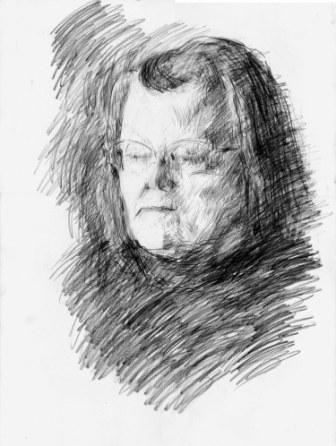Friends and strangers alike wrote me notes with remembered anecdotes, demonstrating how special he was. I read his poetry. His “Pilot Hi-tec point V7 fine black pens” were everywhere; he had accumulated a stash of perhaps 150 of them because he was afraid they would be discontinued. His many notebooks with only a few pages written in them; his clothes—all the shirts he bought secondhand; the artifacts he created--gourds, paintings, rugs: they all invoked his actual being. The roomful of his collection of books set in Maine
Alive, he was a tremendous presence, thoroughly original, brilliant—often described as a genius—but I suspect that a living presence will remain even of those with a less powerful personality. I’m not talking about memories or mere reminders. “You have memories” the sympathy cards state. I am talking about something “out there”, a manifest indication of a life lived. It was not “the spirit of Bill” either; it was more palpable, more human.
I describe my encounters not sure that anyone else will understand. I describe my sense of my husband’s presence after his death. Like God, Bill hasn’t given me any irrefutable evidence that my experience was not just a figment of my imagination or a dream or the chemicals in my brain fulfilling a hopeful wish. This comforting palpable presence faded, and one day I realized that it wasn’t here anymore. I had not wept much until then, was even euphoric with relief, but when the presence was finally gone, I wept often.
God said to Moses, “I am who I am”, always a subject, never an object. Bill continues to be what he was, even now, but he is no longer an object, only a subject.
